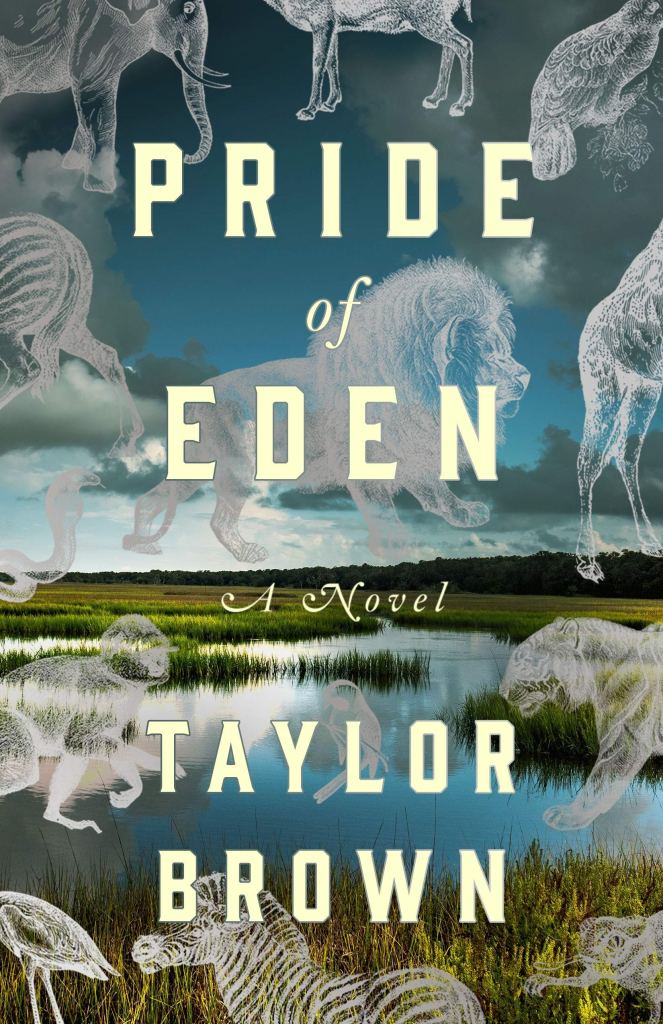When is it acceptable to break the law? Can violence and theft ever be justified in order to right a wrong? And can private citizens take the law into their own hands?
These questions are at the heart of Taylor Brown’s Pride of Eden, recently published in paperback. In fact, when confronted with the argument that his actions are illegal, one of the main characters in the novel says, “Malum prohibitum… Latin. Means ‘wrong because prohibited.’ Wrong because it’s against the law. As opposed to being wrong in and of itself.” It’s clear that he doesn’t much care that what he’s doing is prohibited, because he’s confident that he has right on his side.
Anse Caulfield is a former jockey and Vietnam veteran and currently the proprietor of Little Eden, an animal sanctuary in South Georgia that specializes in rescuing big cats and other exotics. It’s a property that he has acquired under questionable circumstances, but he’s a man who believes pure motives trump everything else. He’s concerned that man is killing off the animals, and has been doing it for a long time: “Then there’s the American bison, the Barbary lion, the northern white rhino … Some say we killed off the saber-tooth and the mastodon, too, at the end of the Pleistocene era. Human hunting pressure.” He’s determined to slow or reverse the process if he can, regardless of the legal obstacles.
He is aided in this enterprise by Malaya, a veteran of the Iraq war, and a woman with her own animal rescue experience, having worked in southern Africa to protect rhinos and elephants from poachers. She also doesn’t let rules stand her way. In the army, she aspired to be one of the first women to attend Ranger School, but that hope was shattered when she encountered a sexist chief warrant officer and made him pay: “She shifted in an instant, attacking him with knees and elbows, edged hands and inked shins. He was reduced to a sack of bones huddled quivering against the wall, leaking from the nose and mouth.” Her army career was over, but she took comfort in believing she’d done the right thing.
One of the hallmarks of a good thriller, these tense moments are scattered throughout the book, both in the present and in flashbacks. Some of the tension is of a sexual nature — early in the tale Malaya is verbally fencing with another game park ranger over their mutual desire, and, later, Anse’s wife suspects that the two animal rescuers are having an affair — but most of the conflict is with a series of bad actors who are mistreating the animals or trafficking in dangerous or endangered species. There’s even tension from the point of view of some of the animals, notably a lion who is nearly killed in Africa but is instead put into captivity in the United States. Also, as one would expect, the story involves a fair amount of violence, gunfire, and blood. Par for the course.
While the novel is engaging, there are moments when it seems to be trying too hard. The characters, both the good guys and bad guys, seem to be as exotic and wild as the animals they seek to protect — even their names are rare — and the reader learns much of what makes them tick through their dreams. There’s little distinction between action in Vietnam, Iraq, southern Africa, or southern Georgia. Wherever they are, they seem to spend a lot of time crawling through swamps and tall grass as if they themselves were big cats hunting their prey, which, perhaps, is the point.
Ambitious and fast-paced, Brown succeeds in portraying complex characters whose hearts are in the right place — they’re all about protecting the animals, after all — despite their extralegal methods. For Anse and Malaya, it’s the animals that matter, and to hell with the law.
FICTION
Pride of Eden
By Taylor Brown
Picador USA
Published March 17, 2020
Paperback July 13, 2021


